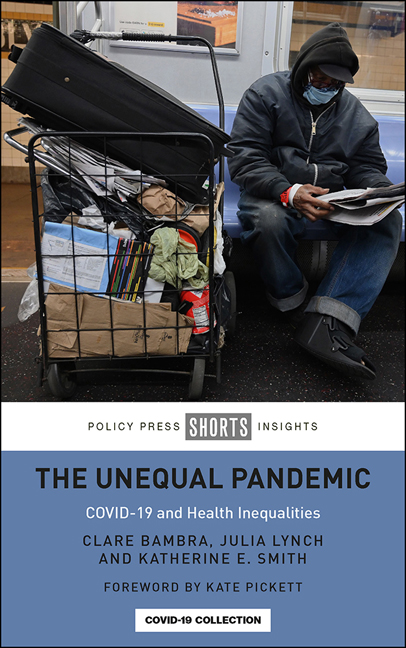Book contents
- Frontmatter
- Contents
- List of figures and tables
- About the authors
- Acknowledgements
- Foreword
- Preface
- one Introduction: perfect storm
- two Pale rider: pandemic inequalities
- three Collateral damage: inequalities in the lockdown
- four Pandemic precarity: inequalities in the economic crisis
- five Pandemic politics: inequality through public policy
- six Conclusion: health and inequality beyond COVID-19
- Notes
- References
- Index
three - Collateral damage: inequalities in the lockdown
Published online by Cambridge University Press: 04 January 2022
- Frontmatter
- Contents
- List of figures and tables
- About the authors
- Acknowledgements
- Foreword
- Preface
- one Introduction: perfect storm
- two Pale rider: pandemic inequalities
- three Collateral damage: inequalities in the lockdown
- four Pandemic precarity: inequalities in the economic crisis
- five Pandemic politics: inequality through public policy
- six Conclusion: health and inequality beyond COVID-19
- Notes
- References
- Index
Summary
When we try to pick out anything by itself, we find it hitched to everything else in the Universe.
John Muir, 1911Introduction
This chapter explores the ‘collateral damage’ caused by COVID-19 and subsequent policy responses designed to contain the spread of the virus. While Chapters One, Two and Four focus on some of the direct health and economic consequences of the pandemic, this chapter brings together evidence concerning the inequalities in the multitude of less direct impacts of lockdown policies, highlighting the complex interconnections between the pandemic and our lives: the syndemic pandemic. For the most part, these indirect impacts are, like the health and economic impacts, deeply concerning and unequally spread; those who are less well-off are also often less well protected and so bear the brunt of the ‘collateral damage’. However, as we will see in Chapter Six, there are also some glimmers of hope when it comes to considering the indirect impacts of the pandemic, especially when we consider potential coalitions for progressive change.
The chapter is organised around Figure 2.2, so it starts by considering the impacts that are most obviously related to health because they are most proximal (for example, the impacts on NCDs and other health conditions) and then moves out, through the various layers of the rainbow. It closes by considering the uncertainties around how the pandemic might reshape the macro-level political, economic and social conditions in which we live and work (a theme which is picked up again in Chapters Five and Six). Since the evidence on collateral damage is new and emergent, the geopolitical focus of the chapter is diverse, drawing in examples in ways that reflect this growing evidence base, though the UK (where a wealth of relevant research has already been published) features throughout.
It is necessary, therefore, to keep in mind the variations in policy responses across different contexts. While some countries (such as the UK) had repeated lockdowns in which people were asked to stay at home and in which schools and nurseries were closed (initially and subsequently en masse but with more sporadic closures in response to outbreaks in between), other countries (such as Sweden) took a more laissez-faire approach, merely restricting large public gatherings but keeping schools and childcare open.
- Type
- Chapter
- Information
- The Unequal PandemicCOVID-19 and Health Inequalities, pp. 35 - 54Publisher: Bristol University PressPrint publication year: 2021



